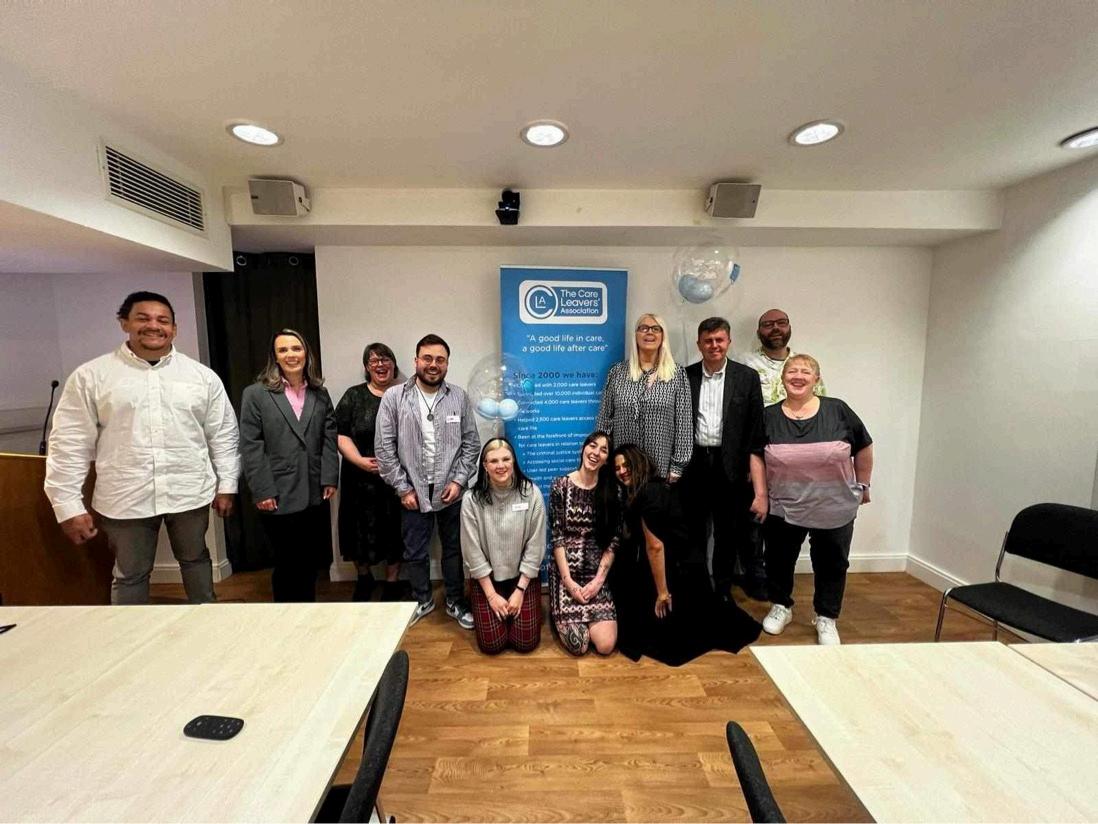Care Leavers Connected

‘But we all shine on’
Feature Article: A Podcast with Paolo Hewitt and Pauline Black


‘But we all shine on’
Feature Article: A Podcast with Paolo Hewitt and Pauline Black

Dear readers,
There are lots of different views about what success looks like for care leavers In this issue we have an article and some quotes from care leavers about what success means to them If you have an opinion about it then please get in touch with your ideas, we welcome different points of view
Also in this issue is an article Paolo Hewitt about his new podcast series ‘But We all Shine On”, which is focused on the life experience of care leavers Paolo writes about where the idea came from and what he is trying to achieve with the Podcast
Jim Goddard, Chair of the Care leavers Association, continues his series on the history of residential child care by looking at the Newton Hall cottage homes run by the National Children’s Home (NCH) in Frodsham, Cheshire
Everyone who writes in this issue is a care leaver. Susan writes about her experience of her apprenticeship and we publish some lyrics by Billy Harrocks ‘Born in Gosport, raised in the grind’ about his life experience.
Whatever your experience, we want to hear from you. If you would like to give any feedback or want to write for our future editions, please email connected@careleavers.com.
If you would like to join the editorial board of this magazine then let us know, volunteers are always welcome.
Editorial Team
If you are reading a hard copy of this magazine and need any of the links included, please contact connected@careleavers.com
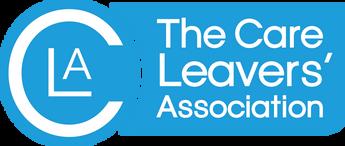

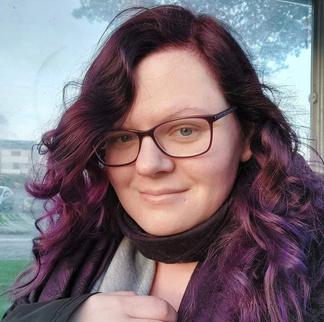

Creative
Showing talent in our community
Health and wellbeing Advice and tips to help you live a healthy life
system issues under the microscope

You will now be able to book a 15 minute slot for a phone call with one of the team every Monday between 9am-1pm using the following link You can also watch our Access to Records video guide here.

We are planning the launch of our Identity project We have had some amazing volunteers to support us in creating a multimedia resource on how accessing their child care files have impacted on their lives. We will be hosting a launch event in July. More information will be available closer to the time
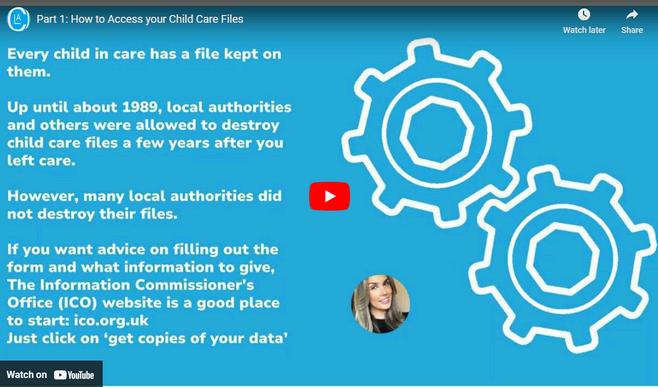
We are excited to announce we will be hosting monthly get togethers for care leavers of all ages in Manchester, Leeds and Cambridge starting from May These will be casual catch ups to meet other care leavers and discuss things that are important to you. More information will follow about these on on our social media and in the monthly bulletin.


We understand that some of the articles in this magazine are about sensitive issues If you need any support please contact us on 0161 826 0214 and leave a voicemail We will return your call You can also contact us by email connected@careleavers com or on social media If you need urgent support please contact the Samaritans on 116123
‘No dictionary definition can ever encapsulate what success looks or feels like for a care leaver’ - Rajinder
Back in 2021, at the CLA’s National Gathering, we asked care leavers to come and speak about what ‘success’ meant to them. We thought this was important because there was a growing discussion about this subject on social media. Several of our members came along and offered us their thoughts on this topic, based on their own lives. This article is partly based on what they told us.

A couple of decades ago, before social media, care leavers were rarely in touch with each other We therefore had to measure our success in life in whatever way we could This often meant measuring our lives against the standard measures of success in wider society These include, in no particular, order: educational success, work success, relationship success, financial success
By those conventional measures, we have all become aware of many more care leavers who have been successful: graduates and postgraduates, media figures such as journalists, professionals of one kind or another, such as lawyers, along with artists, such as writers and poets. However, many care leavers have pointed out that conventional definitions of success, focused on social mobility, are very narrow and leave little room for those who don’t fit this framework
For example, sometimes success just means that if we have been dealt negative experiences in our childhood we manage to avoid passing them on to the next generation; we give our children a better life than the one we were given This has obvious relevance to how some care leavers would define success for themselves
As Jackie put it, at the 2021 event: “My success is my success, no one else’s, and can’t be measured by others Because this was my journey Being a mom that broke the cycle within my family history is my success ”
‘The thorns are pretty well managed now’
There have always been alternative measures of success. Philosophies and religions are built on these alternatives. Many of them encourage us not to compare ourselves with others. As Sally put it, sometimes success is simply “accepting yourself” In a similar vein, Louise suggested that it was “being able to happily live alongside your pain” and helpfully added that,
“I don’t skip through meadows every day, but the thorns are pretty well managed now ” Marlon noted that his ideas of success had changed with age They had moved beyond conventional measures and now focused on “having connections and security”
Conventional successes are often recognised and marked by parents, siblings and wider family These are all figures who are frequently absent from the lives of children in care and care leavers This leaves us with the question of whether something is a success if there is no one apart from ourselves to recognise it At those times, perhaps, as Sally put it, the important thing is, “learning to accept myself as already complete and with nothing to prove ”
We can only ever be our own judges
Ultimately, we can only ever be our own judges of our success This is because we are the only people with the full set of facts on which to base our judgement This includes access to our inner lives Hence why success for some people is, as Rajinder put it, is simply “survival” and that this sometimes is a measure of how well you have protected yourself on your journey through adult life
So, we can all applaud care leavers who have gone on to achieve in life in conventional terms However, it’s clear that what ‘ success ’ means to many of us is far wider than this For others, success is holding down a job or bringing up children, or both Some find being in care has given them the resources to thrive We are all different
If you would like to share what success means to you, please send an email to connected@careleavers com for more details Please note, you can remain anonymous if you would like.

My name is Paolo Hewitt, and I am a writer. More importantly, I’m a care experienced adult. For many years now, I have watched several documentaries about the Care System and in the majority of them, the dark side of care is always portrayed. Drugs, homelessness, alcoholism, prison and despair.
Whilst these issues are very real and to this day, present huge problems, the effect is to paint care in a hugely unflattering light
I experienced this first hand Many years ago, I wrote a book called The Looked After Kid and after its publication I was interviewed by The Times The interview was very pleasant and once over, I found myself walking down the street with the interviewer Just as we reached our destinations, she turned to me and casually said, ‘You know I would never let my daughter sit next to a looked after kid at school ’
An outrageous statement
I know - it’s an outrageous statement and I wish I had been quicker on my feet and replied, ‘One, you would never say that about anyone from a minority and two, I would love it if one of my children sat next to a looked after kid They are the most brilliant and important kids in the world ’
We parted and I began to think about her statement I started to see that the portrayal of care in the media was probably to blame for this woman ’ s perception
It is not just documentaries that commit this sin of one dimensionality Have you noticed how in films or TV dramas, if a child is really bad the last resort is always, if you don’t do what I say, I will put you into care, as if consigning someone to the very
depths of hell Somewhere along the line I came up with the idea of But We All Shine On
This would feature Care experienced adults who had been successful and by presenting them we would start to destroy the damaging stereotypes aligned with Care At first, I thought it would be a TV documentary but despite some interest from a BBC producer who worked with me for about a year, and then ghosted me, (hi Nisha!) there were no takers But when a friend of mine asked if I would be interested in producing a podcast, I realised that this would actually be a great medium for the idea
Thus, But We All Shine On was born One of our first interviewees (I co-host with a redoubtable care experienced man known as Paul Anderson-Walsh) was Pauline Black from The Selecter I had interviewed Pauline 44 years previously (!!!!) when I was at Melody Maker and, of course, both of us were far too inward and shy to reveal our fractured pasts

Now we could sit and listen to Pauline’s vivid experience as a black child growing up in an all-white community, just as we listened to Mark Riddell, MBE and author of The Cornflake Kid, break hearts with stories of his dad’s alcoholism and his struggle to be where he is now – adviser to the Government on care
Jim Goddard of the Care Leaver’s association also came and spoke about his achievement as a highly respected academic His specialist subject? Care of course
We launch on February 3 and have many more interviews lined up, all of them with the same purpose – to inspire all of us in and out of the Care world, to change perceptions, and inspire the world at large

I have published many books, written countless articles, met a lot of Faces But I got an idea this might be my most important work to date
Pauline Black
Pauline was born on 23 October 1953, in Romford, Essex, England, to an Anglo-Jewish teenage mother and Nigerian father She was adopted by a white middle-aged couple and given the name Pauline Vickers. Black studied science at Lanchester Polytechnic (now Coventry University) before training as a radiographer She worked for the NHS before she entered the music industry
Pauline came to prominence in the late 1970s as the lead singer of the 2 Tone ska revival band the Selecter, which released four singles that entered the Top 40 charts in during the 1970s and the 1980s, including "On My Radio", "Three Minute Hero", "Missing Words" and "The Whisper". Rolling Stone said "Hands down, Pauline Black possessed the best voice that ever graced a 2-Tone release
Join host Carrie Harrop with Leah, Abed, Liam, Kaitlyn, & Tyrese as they discuss key issues shaping careexperienced lives in the CLA’s first Care Leaver Voices podcast Listen by clicking on the picture below

If you have any podcast recommendations or want to work on a podcast with us then please get in touch.

The Care Leavers Association has been compiling an audio-visual set of reflections on the work we conducted between 2010 and 2020 focused on looked after children and care leavers becoming involved with the criminal justice system. You can listen to these podcasts by clicking on the picture above.
I had a rough time with my apprenticeship.
I had a rough time with my Business Administration apprenticeship. As with most women dominated industries, my apprenticeship was based on the assessor model. This meant that instead of structured learning, I had an assessor who came out to give me assessments to complete once a week.
Unfortunately, due to funding issues and incorrect module registration I had to complete 9 months of work in 6 months in my free time as the time given in work just wasn’t enough Scotland is the only country in the UK that uses the assessor model and that doesn't mandate 20% of hours for off the job learning
The Scottish Government did a focus group back in 2022 about apprenticeships which helped apprentices to express the many obstacles they were facing. So many frustrated voices asking for better wages, better mental health support and better support to learn. So many changes needed to be made.
The UK Government admits that apprentices pave the way for our future. We train in all the newest careers. They are building apprenticeship paths to so many traditional careers as well. I knew that I had to do something to make these changes a reality and stop an already flawed system from getting worse.
Joining the National Society of Apprentices gave me the chance to take action
Joining the National Society of Apprentices gave me the chance to take action and I dove in head first Since then, I have had so many amazing experiences I’ve been to Edinburgh to plan campaigns and organise letters to politicians across the country I spoke at a student event at the Labour Conference in Liverpool I represented UK apprentices at the OBESSU EGM in Texel
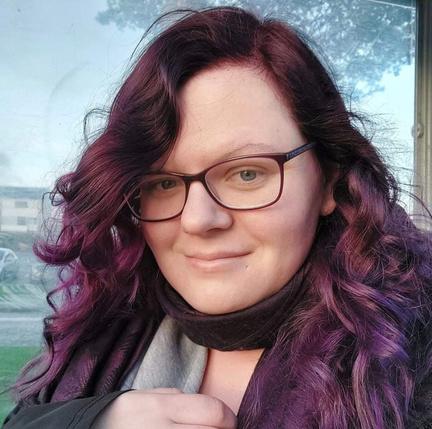
Susan Loughlin
I got to go to London to help build the National Union of Student’s manifesto and then deliver a speech at the House of Commons That was in my first year and I can’t wait to see what comes next So you might be asking why I'm writing about this here and how it applies to the care experienced community as a whole?
My main concern is that they are targeting those of us who are care experienced to become apprentices without providing adequate support Support workers often “encourage” us into jobs with poverty wages at a young age when we are already facing obstacles to cross the bread line
It's not all doom and gloom though Changes have been made including a £3000 care leavers bursary in England for our community
This article is really just to say that if you are an apprentice who is care experienced, you are not voiceless You have someone here, standing in your corner and demanding the quality wages and education that we deserve
Susan Loughlin
Would you like to share your voice but want to remain anonymous?
If you would like to share your voice in future editions, please send an email to connected@careleavers.com for more details. Please note, you can remain anonymous if you would like.
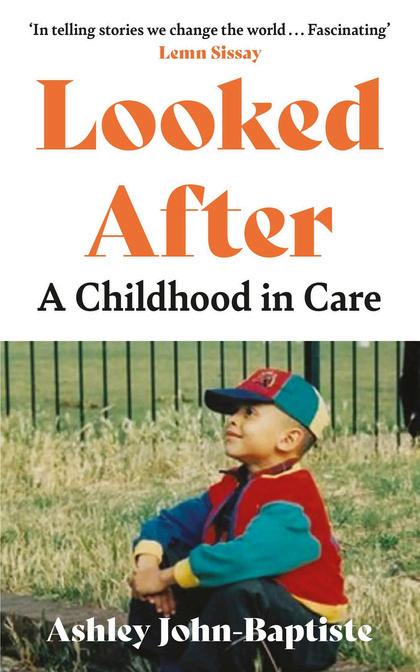
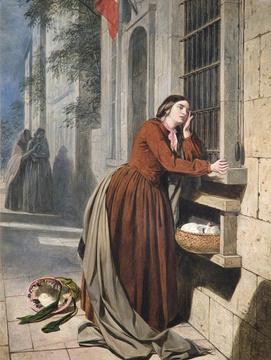

This is a powerful memoir that explores the realities of growing up in the UK care system Ashley shares his personal journey, detailing the emotional struggles, instability, and challenges of finding a sense of belonging while moving between foster homes. His story critiques the care system, emphasising the lack of support and the need for more focus on the mental well-being of young people. Despite these obstacles, Ashley’s resilience comes through, offering a message of hope and perseverance. Looked After is an inspiring and honest reflection on overcoming adversity and the importance of community and support.
Care Experience & Culture recently added a new genre featuring ‘Activists’ and are wondering if Hannah Brown who grew up in the Foundling Hospital, could be the FIRST care-experienced activist Hannah later wrote The Child She Bare, A Foundling (London, Headley, 1919) an account of her childhood experiences and which she published anonymously She writes realistically about her time in the Foundling Hospital and many of her protests and observations are uncannily still relevant today
Deadwater Fell features a character, Tom Kendrick, who is raised in foster care. The series addresses the impact of this background on his adult life, relationships, and decisions While primarily a thriller, the series also delves into the humour that can emerge in family dynamics amidst deep trauma You can see watch it here
If you want to see more care leavers in the culture, then head over to Care Experience and Culture, a website created by Dr. Rosie Canning (UK) and Dr Dee Michell (Australia) who are care experienced scholars with a lifelong passion for reading. Having experienced many benefits from reading as a pastime and aware of the varied representations of care experienced people over time, Rosie and Dee have collaborated to develop a Digital Archive, a one-stop accessible site with information about Care Experienced characters in fiction and on-screen, as well as Care Experienced writers, artists and actors.
This is the second article I have written for the magazine on the history of residential child care, my first article on Barnardo’s cottage homes is in the July 2024 issue. I’m continuing to focus on institutional child care in this issue, by looking at the Newton Hall cottage homes run by the National Children’s Home (NCH) in Frodsham, Cheshire
The NCH was another of the religious charities set up in the late nineteenth century to care for children. There was a competitive religious element to many of these charities, with different religious denominations having their own homes and fostering arrangements. Roman Catholics, Jews, Methodists, Anglicans and others all had their own organisations. NCH was set up in 1869 by Methodists and took both boys and girls.
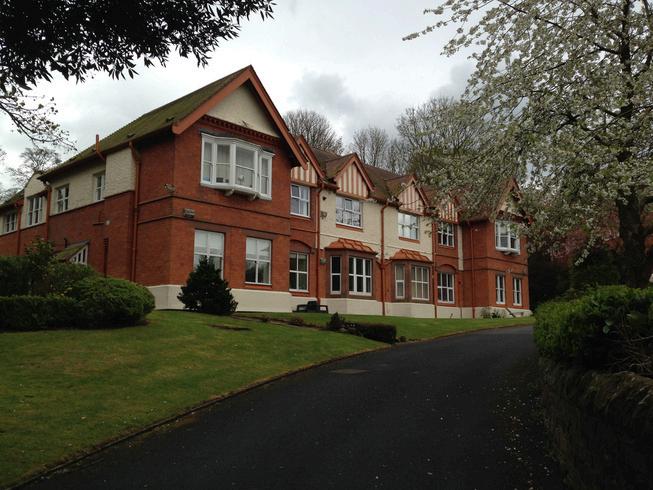
The NCH ran homes that were smaller and less institutional than workhouses and other large institutions common in the earlier nineteenth century The large ‘family’ units in the homes often had a ‘house mother’ and a ‘house father’, seeking to replicate family structures However, these ‘cottages’ were always much bigger – sometimes containing dozens of children – than anything resembling a modern family home
The NCH ran a number of children’s homes sites around the UK, in such places as London, Birmingham, Lancashire, the Isle of Man and Kent Like a lot of the other children’s homes charities, it started closing its homes in the 1960s Many of these charities tried to modernise themselves in the latter half of the 20th century This included change their names NCH changed its name to ‘Action for Children’.
The Newton Hall site, at Frodsham in Cheshire, closed in 1984 visited it and took some photographs in 2017. Now, it is all privately owned and looks like a rather exclusive and well-kep
small housing complex One of the buildings on the site is now a home for elderly people A lot of these former children’s homes have also undergone this transition
The only indication of the past use of this village is a plaque put up next to the village green in 2007 The site, on a main road just about a mile outside the village of Frodsham in Cheshire, is much smaller than Barnardo’s village in Barkingside
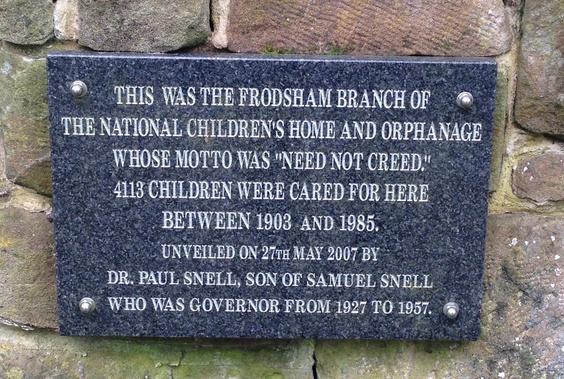
However, it keeps the same idea of having a group of houses built around a village green You can see that from the layout of the site on Google Maps and from an old photograph, taken from the air:


As with Barnardo’s, another striking feature of the village is the church In a lot of these old children’s homes sites, a church was a major feature of village life Here are photographs of how the church originally looked and how it appears now


I’ve known three different care leavers who lived at Newton Hall in the early decades after World War Two. A couple of them were there at the same time. That’s a reminder that although the homes have closed, many of the children who lived in them are still with us as adults. Given when Newton Hall closed, many hundreds of adults in their forties and older will have memories of the place.
One adult who lived in NCH homes is Ronnie Archer-Morgan, the television ‘Antiques Roadshow’ expert. He was in NCH home in London and Southport in his early years and his account of his time there can be found in this memoir, featured in the previous issue of this magazine, ‘Would it Surprise You to Know?’
If you were in the Frodsham home and would like to say something about it, please get in touch We might be able to do a follow-up article, on people’s memories of the place, in a later issue of the magazine


In future editions of this magazine I’m hoping to look at the other places I’ve visited that readers might remember growing up in. So far pencilled in are St Gabrielle’s, Knolle Park in Liverpool (where I also lived for a while), the Quarriers Homes in Bridge of Weir, Scotland, The Minnesota State Orphanage Museum and the Fazakerley Cottage Homes in Liverpool I’m also happy to correspond by email on this subject: jim goddard@careleavers com
This magazine is part of The Care Leavers’ Association National Lottery funded project ‘Care Leavers Connected’ launched in 2024 specifically for care leavers aged 25 and over. The project aims to recognise the challenges many care leavers experience as adults and provide a space to connect with others to share their unique experiences.
Care Leavers Connected Magazine is produced by care leavers for care leavers. It is a safe space to share our stories, ambitions, and tips to support and celebrate everyone in our community. Please take the time to read through the magazine and give us any feedback. We want this to be a place that reflects our community, where people have a voice and can also find resources and connections. If you would like to be a part of the editorial board please get in touch.


Born in Gosport, raised in the grind, Moved through the system, peace hard to find, Foster homes, different roofs, different vibes, Lost boy status, but I’m here, I survived
Youth felt cold, bruv, nights were a test, Had to toughen up quick, kept the pain in my chest, Young offender life, man, it changed my course, Prison walls taught lessons, but they left me worse
From the cells to the streets, I’m still standing bruv, Scars on my soul, but I’m risin’ above, Life dealt me a hand, yeah, it hit me hard, But I’m playin’ my cards, and I’m beatin’ the odds
Done dirt, done time, thought my story was done, But the spark stayed lit, I’m the rise from the slum, Men’s prison as a young’un, man, the weight was real, Had to fight for my name, had to sharpen my steel.
Moved round too much, no roots to grow, But the pain made a poet, yeah, the streets should know, Now I’m penning my life, turn the dark to light, From the foster care struggle to the late-night fight
From the cells to the streets, I’m still standin’, bruv, Scars on my soul, but I’m risin’ above, Life dealt me a hand, yeah, it hit me hard, But I’m playin’ my cards, and I’m beatin’ the odds
Every step was a war, every day was a grind, But I found a voice through the pain in my mind, Now I spit for the lost, for the ones who feel trapped, Bruv, this one ’ s for you, don’t let the world hold you back.
From Gosport streets to the foster care pain, From the cells in the system to a whole new lane, This is my life, no shame in my scars, Still here, still fighting and I’m reachin’ for stars
Hamish created this as a statement piece for the Care Leavers Connected Project
“I have left out two letters because we are all searching for the missing pieces to make connections” - Hamish McGregor
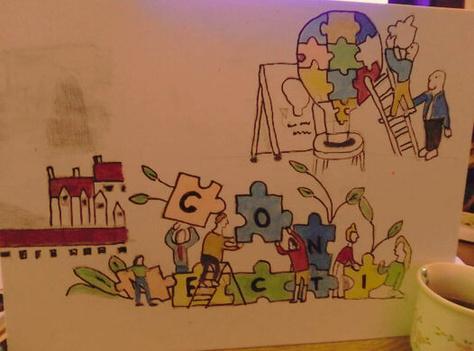
Inner Calm, Outer Beauty: Yasmine writes about how connecting with nature and yoga has a positive influence on our well-being.
Throughout our care leaver lives we are continuously discovering and figuring out what we need to nurture us. Perhaps even more so in January where we are historically bombarded with messages of ‘New Year ‘New Me’.
Personally I feel that a slower, gentler unfurling into Spring is the rhythm that works best for me and is one that I encourage my students and friends to explore
Too often in our modern day lives we are so busy with ‘doing’ that we can often forget to ‘be’, which is where a regular break in nature alongside a yoga practice can help us find that little pocket of peace to gift ourselves the stillness and calm to rest both on a mental and physical level.
Asana (the physical practice) of yoga is often where we will begin our yoga journey, it was definitely where I started mine. However, over time I have come to cultivate an awareness of the myriad of gifts that a regular yoga and meditation practice brings.
Meditation can often feel quite daunting and there are several ways to incorporate meditative practices into our daily lives, which is why I always encourage connecting with nature
Taking time for ourselves
Taking time for ourselves whether that’s in a local park or a more rural setting or if you ’ re lucky enough to live near a river or by the sea. Finding stillness in a world where we are constantly trying to keep up with social media and busy lives. Particularly where we ’ re forging our path in life, careers, relationships and perhaps also raising children. It’s little wonder we need a space to recharge and rejuvenate! Even 10-15 mins a day can provide a time of reflection or just quiet time away from the hustle and bustle of the city.
The breath is really where it all begins and synchronising the breath with movement is where the magic really happens we gradually over time start to feel and see the benefits of these two practices

The breath is really where it all begins and synchronising the breath with movement is where the magic really happens we gradually over time start to feel and see the benefits of these two practices
A physical practice is a wonderful place to explore movement and also start to see the subtle benefits of allowing ourselves the time to pay attention to what’s going on for us both on and off of our yoga mats
Taking time to connect with nature can in and of itself promote a sense of calm and wellbeing It has been affectionately coined ‘forest bathing’
Calming our nervous system has a positive impact on how all of our systems in the body function optimally, these are just some of the attributes of a regular practice, a greater awareness of our breathing, improved sleep patterns a healthier body and glowing skin
All in all allowing a radiance to come from within that can only contribute and enhance our outer beauty and contribute to an inner sense of calm
If you have any health or wellbeing tips please share them with us for future
Terri-Anne Hamer reports on her attendance at a conference in Barcelona focused on care leavers needs
I had the privilege of attending the recent FEPA (Federación de Entidades con Proyectos y Pisos) conference in Barcelona this October, marking 25 years of FEPA’s work to support care leavers as they transition to independent adulthood.
Under the theme “Acompañando Futuros” (“Accompanying Futures”), the event brought together practitioners, policymakers, and advocates from across Europe. I was there representing the Care Leavers Association from the UK, alongside attendees from Spain, Greece, Italy, and Germany. This collaborative conference was an amazing opportunity to exchange insights, address shared challenges, and explore effective approaches to help young people as they exit the care system.
One key topic was community-based support models Spain presented its approach of embedding care leavers within neighbourhoods to foster community connections Spanish care organisations integrate young people into local networks, which reduces isolation and helps them develop a sense of belonging
This approach, focusing on social bonds, aligns with the mentorship-focused models in Greece, where care leavers are paired with mentors who offer guidance and emotional support The UK could learn from these approaches by exploring ways to expand community-based mentorship programs to address social isolation among care leavers
Italy’s self-managed housing model also stood out
Italy’s self-managed housing model also stood out as a practical approach that enables care leavers to take responsibility in managing their own spaces, reinforcing skills needed for independence This method blends autonomy with structured support, providing care leavers the freedom to self-govern while still having access to resources when necessary The model reflects a strong emphasis on empowering care leavers, which resonated with many attendees as a promising way to foster both confidence and responsibility
Germany’s input centred on the importance of legal frameworks With well-defined entitlements ensuring care leavers’ access to housing, education, and employment up to the age of 21 and sometimes longer Germany showcased the impact of structural, rights-based support In the UK, a similar legal foundation exists, but there was discussion around the need to make such policies
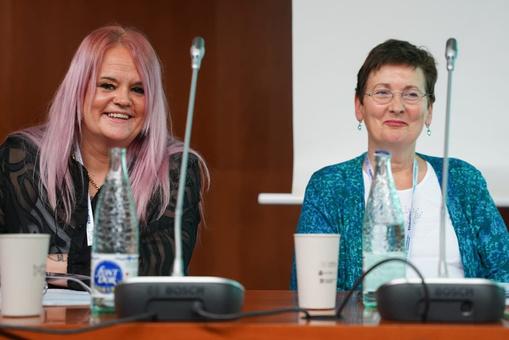
more accessible and consistent Germany’s model also reinforced the benefits of clear, legally backed support for unaccompanied asylum-seeking children (UASC), an area where other countries, including the UK, often experience gaps in service provision
The UK brought to the table its comprehensive entitlement system, which includes housing, financial assistance, and educational support for care leavers. Although relatively robust, UK delegates acknowledged the challenge of making these supports readily available to all care leavers, particularly for UASC. Discussions highlighted how countries like Spain and Greece focus on more personalised, trauma-informed support, suggesting that the UK might benefit from blending this with its existing policy framework.
Care leavers often benefit most from networks that foster social and emotional resilience.
Across all sessions, a recurring theme was the need to balance legal entitlements with relational support systems While formal rights are essential, care leavers often benefit most from networks that foster social and emotional resilience This conference underscored the importance of combining structured policies with relational support to create more holistic approaches to emancipation
Phone: 0161 826 0214
Email: connected@careleavers.com
Address: The Care Leavers' Association 3rd Floor, Swan Buildings, 20 Swan Street, Manchester, M4 5JW
Join our Care Leavers Connected Zoom groups. Our next date is Monday 24th February 2025. These sessions start at 7pm and are an opportunity to connect with other care leavers and discuss things that are important to you. If you would like to join this session Sign up here
Jim’s Zoom sessions run once a month, on the first Wednesday of the month between 8-10pm. They sometimes have a topic for discussion and sometimes we just talk about any topic that those who turn up want to raise. They always try to find subjects that are of interest to all people who have been in care as children. Sign up here
We currently support many people across different generations in accessing their child care files. In the future, we be running some drop in sessions for support with accessing your files. In the meantime, if you need any support in accessing your file, please click here.
Justin Fashanu was the UK's first openly gay professional footballer. He also grew up in care, in a Barnardo's home and then foster care, in the 1960s and 1970s. The CLA is hosting a book launch for a biography of him on Sunday 9th February 4-5 p.m. If you'd like to join us, Sign up here
Are you finding it hard to keep up with the cost of living and need data? The CLA has launched "Keeping Care Leavers Connected" in collaboration with The Digital Inclusion Network. If you need data assistance, reach out to us at connected@careleavers.com
There will be a meet-up for everyone who can make their way to London on Saturday 29 March 2025, 2-4pm. All care leavers are welcome. If you want tocomethen please let us know by registering here
At Care Leavers Connected, we are determined to ensure that care leaver issues are addressed by both national and local government. We want to make sure that care leavers have as good a life as possible. If you want to join us in this campaign, then get in touch: connected@careleavers.com

If you simply don’t have the time to get actively involved in the CLA, but you still want to support our work, you could think about making a donation. All donations will go towards helping the CLA to keep going and to running our projects and campaigns. Also, because the CLA is a registered charity, we can claim an extra 20% back from the government for every £1 you donate.
